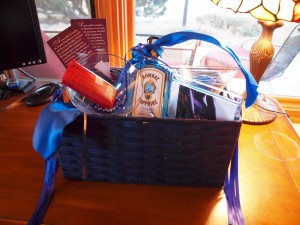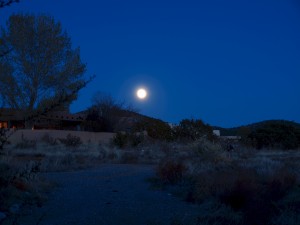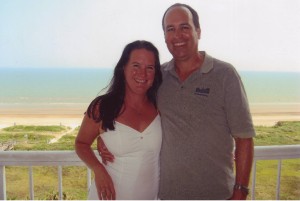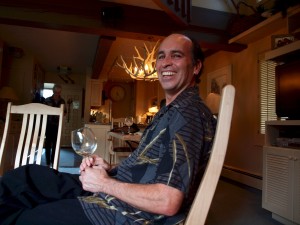 Sometimes I wish I could make the photos really big, so all the subtle variations stand out. Guess you’ll just have to come sit on my porch. I’ll give you a blanket and a mug of mulled wine.
Sometimes I wish I could make the photos really big, so all the subtle variations stand out. Guess you’ll just have to come sit on my porch. I’ll give you a blanket and a mug of mulled wine.
My waxer is a lover of sexy books and an aspiring writer.
Isn’t everyone’s?
I know, I know – it kind of sounds like an episode of Californication. My waxer – I’ll call her Angelica – is the polar opposite of Marcy. Angelica is an Amazonian redhead, with this very glam look and an incredibly sweet heart. She has a thing for firemen and runs her salon with style and aplomb. She once wrested my Kindle from me and wrote down the title and author of every book I had on it. She’s read my books and asks me questions about writing hers.
She’s at that stage where she’s still playing with it. She’s done the thing where she’s read the really awful book and thought “I could write something way better than this.” She asks me questions about my process, like if I write a book from beginning to end (I do) and how much I go back to revise (easily a month’s worth of writing time). All of this in the approximately ten minutes it takes her to give me a Brazilian. She’s not only skilled, does a perfect job – she’s also really fast.
I see her about every six weeks and two appointments ago, she told me her sister suggested that she take a one-week course on romance-writing at the Iowa Writer’s Program. I had no idea they were offering one now – go figure. I do know a fair number of writers who graduated from that program though and I have a pretty good idea that it wouldn’t be cheap. I told her it might be a great experience, but that there’s so much available online and through local RWA chapters, that she should consider starting there first. In fact, I said, the New Mexico local chapter, LERA, is having a one-day conference in November (now this Saturday) where we’re bringing in a gal to teach deep editing techniques. I told Angelica she should come; I tried to get her to mark out the day in her appointment book.
And she totally balked. She didn’t really have five opening chapters. She wasn’t ready to learn to edit. Her work isn’t at a place where anyone else can look at it. It didn’t matter that I told her she had three months to put those five chapters together, that only she would see it and that learning to look critically at your work is a huge step.
She wasn’t ready and I let it go.
So, then, the most recent appointment, she said her sister told her she’d read about all these people who self-published their books and made millions and what did I think of that? Could that be a viable option for her?
I tell you, these stories about the Amanda Hockings of the world are attaining the level of urban myth.
So, yes, I tell her – things like this have happened for people. But they are isolated cases (I didn’t mention that they’re also regularly and wildly distorted) and that the people who seem to be doing the best with self-pubbing are those writers with either established audiences or backlists of already polished work. I asked her if she’d encourage someone to open a salon who’d never worked in a professional capacity before and she got my point.
Now, I hope I don’t sound negative about self-publishing here, because I think it’s becoming a great option for many writers. But it’s disturbing to me that some people are seeing it as an option to skip the critical step. Not the crucial one, though it’s that, too, but the many-layered process where you learn to critique your own work, to assimilate the criticism of others, to incorporate editorial input that shapes the story and to view the work in light of the readers’ expectations and the marketplace.
Yes, this is the painful and awful part of being a writer. I really don’t blame anyone for wanting to skip it.
It would be a lovely world if we could write our stories and they would emerge full-fledged and perfect, ringed by rainbows and escorted by white ponies with ribbons in their tails.
This is not that world.
So, what I tried to get her to see is that she needs to apply all the work she put into becoming a terrific aesthetician – and she’s one of the best I’ve ever encountered – and to building her business and creating a well-run salon, and put that into becoming a writer. You don’t need a certificate from a fancy writing school, but you do have to work at it.
And, if you’re not ready to show it to people for critique, you’re not ready to publish it.
No golden tickets to fame and fortune, alas.
Though I wouldn’t mind one of those white ponies with the pretty ribbons.
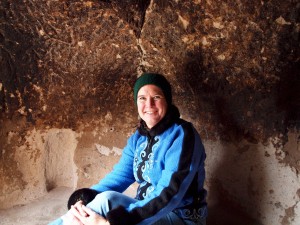 A photo of me at Bandelier National Monument this last weekend. The cliff dwellings are particularly fun to see, since you can climb up into them.
A photo of me at Bandelier National Monument this last weekend. The cliff dwellings are particularly fun to see, since you can climb up into them.